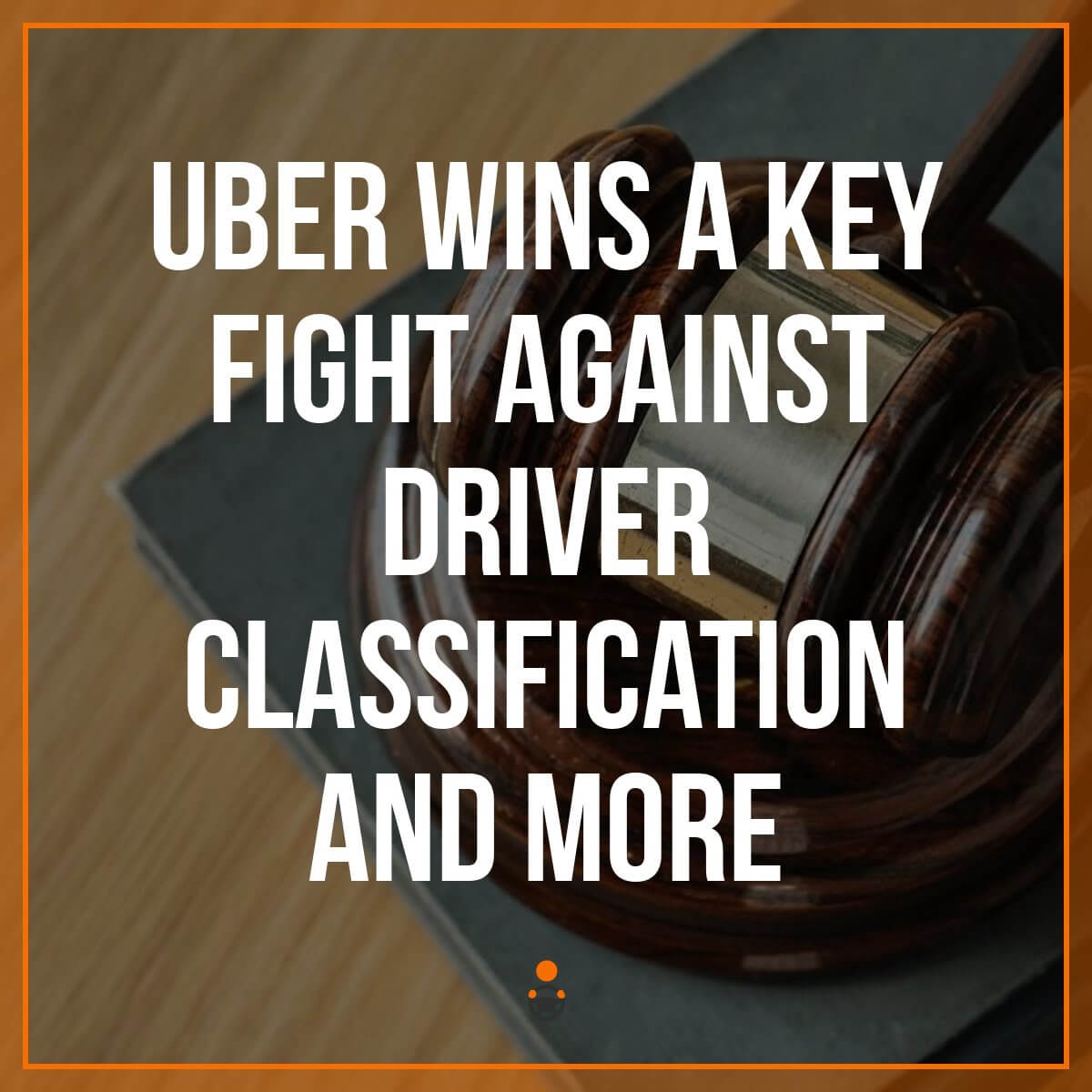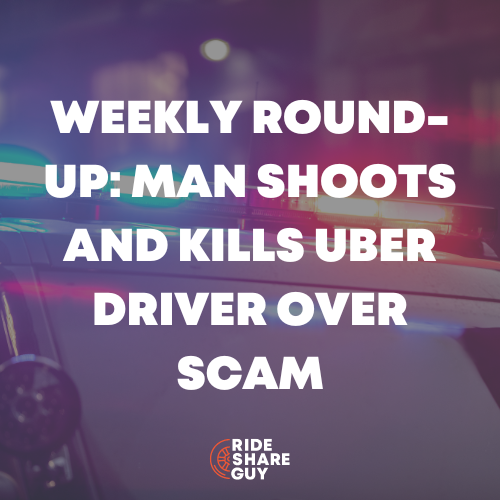There’s a number of stories to get to this week, including Uber’s recent win in a fight against treating drivers as employees. Were you surprised by this ruling? Read senior RSG contributor John Ince’s take below and let us know. Plus, weird things passengers leave behind in cars and more in this week’s round up.

Uber wins key ruling in its fight against treating drivers as employees [ArsTechnica]
Sum and Substance: A federal appeals court handed Uber a significant win Tuesday in its battle to avoid having its drivers declared to be legal employees. Uber has asked the courts to throw out the lawsuit, because Uber’s driver agreement requires this kind of dispute to be handled in private arbitration instead—an endorsement that the 9th Circuit Appeals Court has now accepted.
Uber says that its drivers are legally independent contractors, not employees. That’s significant because federal law strictly regulates the relationship between employers and employees.
Employees are guaranteed to earn federal minimum wage and are entitled to overtime pay if they work more than 40 hours per week. Uber employees, in contrast, are paid by the ride and might earn much less than minimum wage if they drive at a slow time of day. California law also gives employees the right to be reimbursed for expenses they incur on the job, which would be significant for Uber drivers who otherwise are responsible for gas, maintenance, insurance, and other expenses of operating an Uber vehicle.
Hence, the question of whether Uber drivers are employees or independent contractors is a big and important one. It’s also a question that isn’t addressed at all in Tuesday’s ruling, as the courts never get to the substance of the plaintiffs’ arguments about employment law. Instead, a three-judge panel of the 9th Circuit court ruled that the drivers signed away their rights to sue in court when they signed up to be Uber drivers. Uber’s agreement with drivers requires that this kind of dispute be handled by private arbitration rather than by a lawsuit in the public courts. The court cited a Supreme Court ruling handed down in May that held that federal labor law did not preempt arbitration agreements.
That doesn’t end the case by any means, but it does significantly tilt the playing field in Uber’s favor.
My Take: Score one for the rich and powerful at the expense of the struggling worker/driver. I first received word about this from Shannon Liss-Riordan. Her email said that they were evaluating their options including an appeal.
In the meantime, myself and others who have indicated a desire to move to arbitration will be represented by Ms. Riordan and her law firm. I have no idea what the chances are in that venue – but it certainly seems that Uber has made clear they consider their bottom line more important than the welfare of their drivers. Anything else they might tell drivers and the public is belied by their actions in this lawsuit.
Driving for Uber and Lyft full-time is getting harder [Fast Company]
Sum and Substance: Uber has for a long time maintained that it is a platform not intended for full-time work. But for the duration of Uber’s existence, a determined minority of drivers have used the platform for full-time work. Now a new survey from JPMorgan Chase indicates that working full-time as a driver is becoming financially untenable. In 2017, ride-hail drivers earned half what they earned in 2012 and 2013, according to the report. In practice, that means drivers earned a monthly average of $1,469 in 2012. By 2015, monthly earnings average dropped to $783.
Over the last few years, drivers have consistently complained about declines in rates of pay. Uber was quick to contend that “monthly earnings” are not the same as “hourly earnings,” which the report did not comment on. In a Medium post, Uber senior economist Libby Mishkin contended that earnings may be decreasing because more people are driving for Uber. In 2014, she says, 160,000 Americans were working for Uber; today, that figure is over 900,000. “If the share of our partners who drive only occasionally has increased over time, as it has, it stands to reason that the average of every driver’s monthly (or, for that matter, weekly or yearly) earnings would decrease.”
My Take: For anybody who has been following this space for awhile, there is no surprise here. But here we have a highly paid analyst at JP Morgan Chase writing a fancy report that basically confirms what we’ve been saying and writing for years. So glad they’ve come around to our point of view.
15 Craziest Things People Forgot in Ubers [Readers Digest]
Sum and Substance: Forgot your phone, wallet, glasses, or keys in your Uber last night? You’re not alone. But what’s the craziest thing you’ve left behind? Here are the most surprising things recovered in Ubers.
Based on Uber’s recently released Lost & Found Index, you’re most likely to leave something behind in an Uber on Sunday night, and the folks in DuBois, Pennsylvania, are the most forgetful in the country.
- Phone
- Wallet
- Keys
- Clothing
- Glasses
- Bag
- Backpack
- Vape/Ecig
- Headphones
- ID/Drivers License
- A bridal veil
- Left by a bride-to-be? Or after the ceremony on the way to the honeymoon? Only she and her Uber driver know for sure.
- A 1.3-carat round diamond
- Another potential wedding or marriage snafu: Did it fall out of a ring? Or was it being taken to the jeweler for a setting?
- Divorce papers – To put a bow on the marriage files, why not leave the signed divorce papers in the Uber you took home from your lawyer’s office?
My Take: Here’s a fun article. Before reading it try to guess what people have left behind. Then try to remember the most unusual items left in your car and share with us in the comments. Let’s see if we can top Reader’s Digest on this one.
Uber to pay $148 million in data breach settlement [Techcrunch]
Sum and Substance: Uber has agreed to pay $148 million to settle a data breach that affected some 57 million customers in 2016. The agreement was with the attorneys general of all 50 states and the District of Columbia to resolve their legal inquiries on this matter, Uber’s chief legal officer Tony West said in a statement released Wednesday. The data breach affected 50 million riders and 7 million drivers; around 600,000 driver license numbers for U.S. drivers were also included in the breach.
Uber’s response and cover up of the breach led to the firing of Joe Sullivan, the company’s chief security officer at the time. Uber didn’t report the incident that occurred in October 2016. Instead, the company paid hackers $100,000 to get rid of the evidence and keep the data breach a secret, which Bloomberg first reported.
My Take: I had forgotten about this case, and the settlement brings back dark memories of the dark days in Uber’s recent past when they would think nothing of using hush money to cover up a massive data breach. Under new CEO Dara Khosrowshahi, things have changed… or at least we hope they have.
How rideshares are improving your quality of life [Bellhop]
Sum and Substance: In a joint groundbreaking rideshare survey conducted by Bellhop, RideGuru and The Rideshare Guy, respondents showed how changing mobility options are impacting their daily lives from increased sociability, earning potential and networking, to reduced car ownership and DUIs. Respondents are even marrying people they meet in pool rides.
[Takeaways include]:…
Is Pool the New Tinder & LinkedIn?
14% have been offered work through connections made in pool rides
32% made friends or useful connections through pool rides
1 in 50 went on a date from meeting someone in a pool ride
3 respondents married someone they met in a pool ride
5. Rideshares are changing the way people drink/drive and view car ownership
A staggering 63% said rideshares had stopped them possibly driving under the influence
39% of respondents are less likely to buy vehicles because of rideshares.
6. Bikeshare usage is still in the very early stages although respondents are open to combining modes in the future
Only 14% were regular users of bike or scooter shares however, 30% saw themselves using them more in the future.
Biggest Factors in Choosing Bikes over Rideshares?
Exercise – 26%
To Save Money – 30%…
Editor’s Note: An interesting, comprehensive study on how both passengers and drivers feel about the rideshare industry, pay, and more. Curious about how most people feel about autonomous vehicles? That question, plus even more on driver compensation, is covered in this study summary.
In-car commerce startup Cargo raises $22 million led by Founders Fund [TechCrunch]
Sum and Substance: Cargo, the startup that helps ridesharing drivers earn money by bringing the convenience store into their vehicles, has raised $22 million in a Series A round led by Founders Fund.
Additional investment came from Coatue Management, Aquiline Technology Growth and a number of high-profile entertainment, gaming and technology executives that include Zynga founder Mark Pincus, Twitch’s former CSO Colin Carrier, media investor Vivi Nevo, former NBA commissioner David Stern, Def Jam Records CEO Paul Rosenberg, Steve Aoki, Maria Shriver and Patrick and Christina Schwarzenegger.
To date, Cargo has raised $30 million in venture funding. As part of this latest round, Founders Fund partner Cyan Banister is joining the board.
Cargo provides qualified ridesharing drivers with free boxes filled with the kinds of goods you might find in a convenience store, including snacks and phone chargers. Riders can use Cargo’s mobile web menu on their smartphones (without downloading an app) to buy what they need. Cargo has previously partnered with Kellogg’s, Starbucks and Mars Wrigley Confectionery — companies looking for ways to market their goods to consumers.
Editor’s Note: Cargo continues to grow and grow, benefiting both drivers and Cargo itself. Given the news above regarding driver pay, it makes sense drivers are looking for innovative ways to increase their income – and Cargo fulfils that gap. Best of all, it’s a win-win for both drivers and passengers. No more needing to provide mints or your own car charger if you can up-sell a charger or provide certain goodies free of charge to your passengers.
Readers, what do you think of this week’s round up?
-John @ RSG




